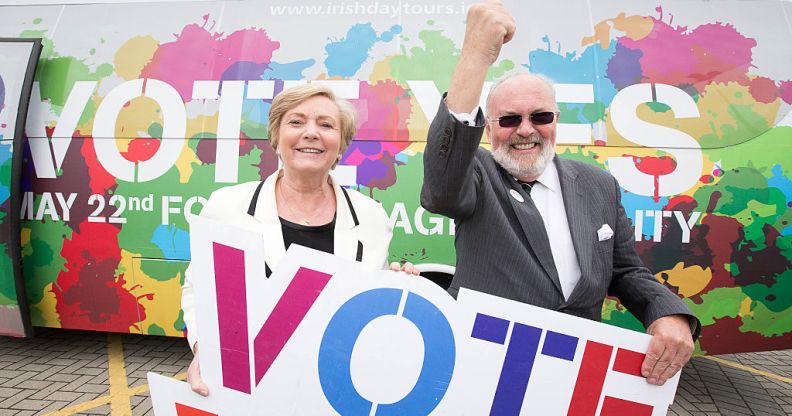The shocking story behind a gay rights activist’s controversial 1975 TV appearance which sparked mass complaints

Former minister for Justice and Equality Frances Fitzgerald TD (Fine Gael), and Senator David Norris. (Karl Burke/Washington Post/Getty)
Irish senator David Norris has revealed that his television appearance in the 1970s attracted complaints because he refused to say he was “sick”.
Norris, who successfully challenged Ireland’s ban on gay sex in the 1980s, became the first openly gay person to appear on Irish television in 1975 when he was invited to contribute to a programme called Last House.
But the senator’s appearance took a turn when he was asked by the interviewer if he agreed that gay people are “sick”.
Needless to say, Norris disagreed – and his refusal to state that gay people are “sick” led to complaints.
David Norris attracted complaints in 1975 when he refuted the idea that gay people are ‘sick’.
“That programme was found to be at fault by the complaints commission because I said I wasn’t sick,” he said during an appearance on RTÉ’s Keys To My Life on May 10.
“We weren’t allowed to say that. I immediately applied for sickness benefit and they wouldn’t give it to me,” he added.
That first television appearance was a controversial moment in Ireland. Homosexuality was still illegal – it would remain so until 1993 – and anti-LGBT+ sentiment was common.
That programme was found to be at fault by the complaints commission because I said I wasn’t sick.
It was so common that Ireland’s state broadcaster RTÉ actually offered to disguise Norris’s voice and disguise his identity during the interview.
But Norris refused, saying he would not do the interview if they tried to disguise his identity.
“The whole point of it is to show me as a human being, to take away the fear that people have that gay people are monsters,” he said.
Norris was instrumental in having Ireland’s ban on gay sex overturned.
Norris also opened up about his failed bid for the presidency in Ireland in 2011, saying he was knocked back by “homophobic” attacks.
He later developed liver cancer and claimed in his Keys To My Life interview that the disease was caused by the trauma of his failed campaign.
Norris is one of Ireland’s most renowned gay rights activists. Throughout the 1980s, he took a series of high-profile legal challenges to the Irish courts arguing that the country’s ban on homosexuality infringed on his right to privacy.
He was overruled by Ireland’s High Court and Supreme Court before he took his case to the European Court of Human Rights.
There, Norris was finally vindicated when the court ruled that Ireland’s draconian law went against the European Convention on Human Rights.

